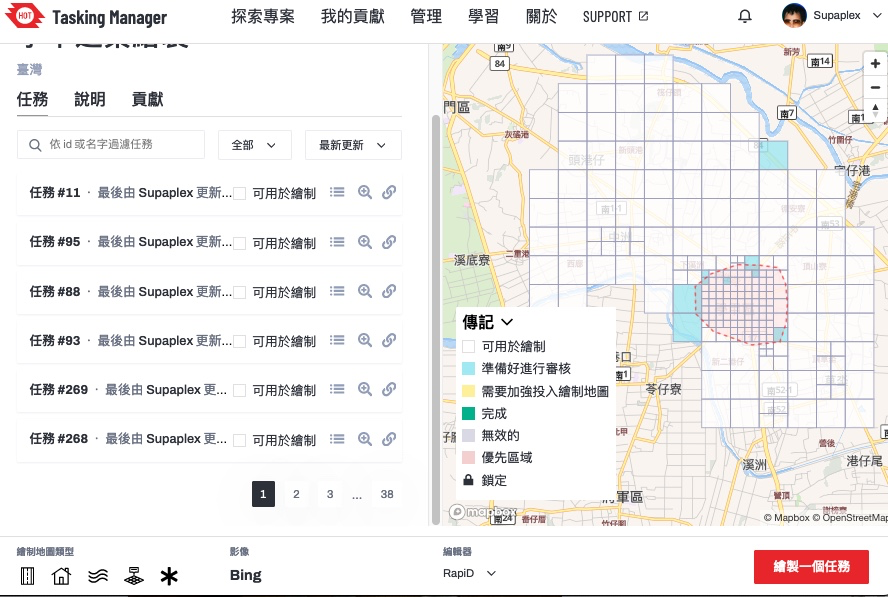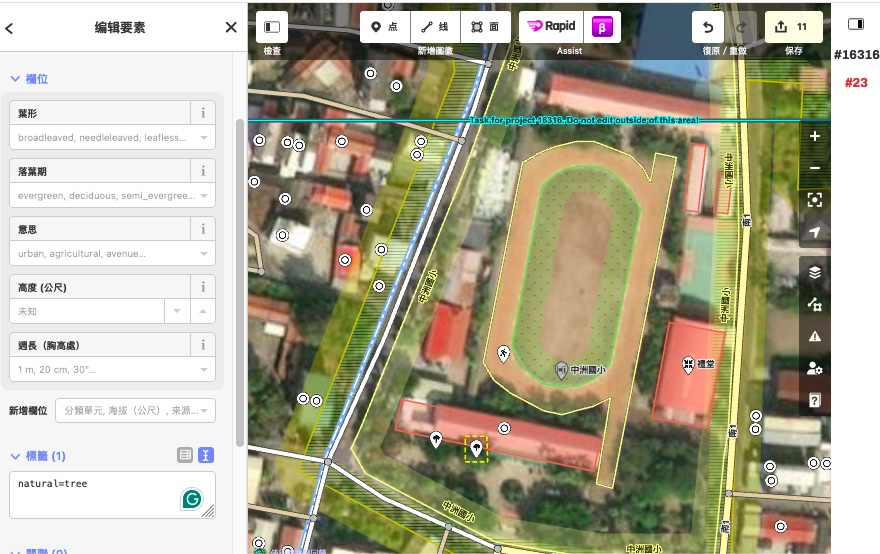We must thank TomTom Taiwan Office for arranging a workshop through their colleague’s connection with the Department of Survay, NCKU. The OpenStreetMap Taiwan Community has applied for the HOT Tasking Manager’s admin role for creating its local project that suits local needs. It is quite a good fit for the NCKU Workshop: using Tasking Manager for local mapping projects and mapping local stuff.
- HOT Tasking Manager Project link: https://tasks.hotosm.org/projects/16316
- Slides link: https://hackmd.io/@osm-tw/HJJqv7HC6#
- OSMCha link: Changesets of participants
 ▲ Tasking Manager project page. This project’s main goal is to map Xiejie District, Tainan City.
▲ Tasking Manager project page. This project’s main goal is to map Xiejie District, Tainan City.
There are a total of 107 changesets, 29 from our staff, and 3 from community members for the NCKU workshop. The number of participants from NCKU is 22 students with a total of 75 changesets. During the whole workshop, there are 369 buildings mapped.
When the students start doing the mapping, they are quite concentrated on the project. The lecturer first tells them the basic knowledge of OpenStreetMap, then the mapping process, and then finally lets the students begin mapping buildings. Due to the time slot limitation of only 1.5 hours, it is not enough time to map even a single task unless the mapper chooses a very rural area.
The host organization for the workshop is the Survey Department, NCKU. When chatting with the professor, the professor mentioned that they frequently use OpenStreetMap during research. The professor knows the early OpenStreetMap Taiwan community Dongpo, and his knowledge of OpenStreetMap comes from Dongpo. It is quite reasonable due to Dongpo’s background in geographic science.
 ▲ National Cheng Kung University is located in Tainan, which is quite well-mapped on OpenStreetMap
▲ National Cheng Kung University is located in Tainan, which is quite well-mapped on OpenStreetMap
We have someone look at the huge land use issue which is a long long time ago import stuff, slicing the land use to a much smaller, manageable size. The other feedback from the community that I received, suggested closing certain map features. I think if we are mapping the old Tainan City, it is obvious that we should close nodes or POIs to make the whole loading map feature size smaller. But we are mapping Xiejia District, which is not in the city center, so the total data size and the possibility of mis-combined something is also small.
When we prepared for the NCKU workshop, we thought about the MapRoulette Challenge. But MapRoulette website is unstable and the micro-task is too technical and data-driven, which might confuse students. They might know the process but have no idea why they are doing it. At the last OSMF Board meeting, one of the members invited MapRoulette website author Martijn van Exel to report during the board meeting, asking for assistance from OSMF for the MapRoulette website. If we use MapRoulette, we might run into downtime.
After 3/25, we must ask Taiwan’s community for a favor and continue mapping the project. It should be expected that students have a low retention rate. School life is fun and they have so much stuff to do. The Taiwan community will open other tasks for mappers to map specific Taiwan areas.
We also have feedback for HOT. They are quite good for training the Tasking Manager admin role. After you join the HOT Slack Workplace, you can ask questions in real-time and soon get a response. For the embedded editors in HOT Tasking Manager, both the iD and Rapid localization are not set correctly to zh-tw, but to zh. The community in Taiwan has already translated many of the terms on the Transifex translation platform from English to Taiwanese Mandarin. We explained to the student that we already fully translated the UI interface, but the language detection and setting were wrong.
In the long term, the community is looking forward to promoting in schools, whether we are in universities or high schools, there is a one-time or multi-time workshop event. We want to show the real way of mapping - in a community way. Just like the workshop in NCKU, using HOT Tasking Manager to split a big area into smaller tasks for mapping. Right now we only can observe the history pages to know if there might be a school workshop mapping in the surrounding area. And normally school teachers are not familiar with OpenStreetMap, and the student’s edit situations vary. If there is a community member who can guide, will make the whole mapping event much smoother and avoid trouble edits.